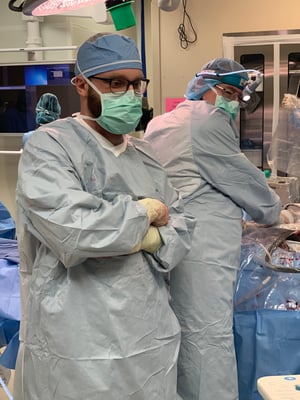In 2012, Phoenix Perinatal Associates, a Maternal-Fetal Medicine team at Banner University Medical Center in Phoenix, AZ, implemented a new program that would profoundly impact outcomes for their patients. The program focuses on placenta accreta spectrum disorders, a condition occurring when the placenta remains attached to the uterine wall, causing severe blood loss during delivery.
A transformational program
Due to the increase in caesarean section deliveries, placenta accreta has become a more common complication of pregnancy. As with most complex issues, this can create an adverse situation with unexpected challenges, including not having the necessary specialists available in the delivery room. The team at Phoenix Perinatal Associates believed that there had to be – and should be – a better approach. The team spent a year carefully reviewing available literature, having multi-disciplinary meetings, and planning. Their goal was to ensure the program incorporated the appropriate individuals and allowed all procedures to be performed in a single location with the best equipment to provide exceptional care. They implemented many concepts that are commonplace today, but were unheard of at the time, including massive transfusion protocol. The program they developed required a team of specialists, including a surgical oncologist who provided advanced surgical skills when required.
In the first 12-18 months of implementing the program, the team saw remarkable results. The program allows the full team to be invested in a great outcome for the patient by looking at which complications are happening and working together to minimize them. Through this approach, they have reduced the need for blood transfusions and reduced bladder injuries. After each patient, the clinical team conducts a debrief to define successes and challenges. Kevin Huls, M.D., Medical Director, summarized their success: “Most of our patients were able to have these complicated procedures done without experiencing any complications or transfusions.”
Improved patient experience
 When Carley Payne was diagnosed with placenta percreta, she was grateful to be in Phoenix and under the care of the Phoenix Perinatal Associates team. As a former nurse and having been diagnosed with placenta previa during a previous pregnancy, Carley had some knowledge of the condition, yet the research she did online was scary. She credits her care team for helping her feel prepared. They walked her through every step of the process to ensure she knew what to expect.
When Carley Payne was diagnosed with placenta percreta, she was grateful to be in Phoenix and under the care of the Phoenix Perinatal Associates team. As a former nurse and having been diagnosed with placenta previa during a previous pregnancy, Carley had some knowledge of the condition, yet the research she did online was scary. She credits her care team for helping her feel prepared. They walked her through every step of the process to ensure she knew what to expect.
Like Carley, most moms with a placenta accreta spectrum diagnosis experience fear and anxiety. It can often lead to the need for a hysterectomy and emotional turmoil related to the potential of not being able to hold her newborn immediately after delivery. While the Phoenix Perinatal Associates team knows having their placenta accreta program in place is important clinically, they also do their part to ensure the birthing process still contains happiness and joy. They approach each case with consistency and dedication to a positive outcome. Carley, who successfully delivered her baby girl on May 22, 2020, said, “The team was competent. I wasn’t nervous for them to perform the surgery. They were caring and calm.”
Broadening their reach
The team’s early successes have fed a desire in others to learn the protocol. They work with many residents and fellows who can learn the approach and utilize it in their future care of patients. “We’re proud of how well our patients do and all the team that is involved, including our residents and fellows. It’s a good learning opportunity for them,” states Kisti Fuller, M.D. The program is recognized throughout the local community and patients are transferred to Banner University Medical Center Phoenix, where they can receive specialized care. “Our volume and experience caring for these patients has established our program as a trusted resource within the state, and we as a practice are honored when community providers place the care of their patients in our hands,” says Michael Leovic, M.D. As the team continues to expand their program, refine protocols, and improve outcomes for patients with placenta accreta spectrum disorders, more moms like Carley will be able to receive the highest quality care.
Meet the team
Kevin Huls, M.D.: Dr. Huls currently serves as the Medical Director for Phoenix Perinatal Associates and MFM Fellowship Director for University of Arizona College of Medicine. Dr. Huls was on the initial placenta accreta program planning committee and has been the lead MFM for surgical cases since 2012.
Kisti Fuller, M.D.: Dr. Fuller worked on placenta accreta cases as a resident and fellow and felt the need to improve the process and outcomes. She joined the team in 2017. Initially mentored by Dr. Huls, she now mentors to other residents and fellows.
Michael Leovic, M.D.: Dr. Leovic recently joined Phoenix Perinatal Associates after completing his MFM fellowship with the practice. During his training, he participated in over 60 placenta accreta cases and has been active in researching the team’s protocols and outcomes.
.jpg?width=600&name=IMG_2603%20(1).jpg)
The physicians in the photo are from left to right: Dr. Matthew Borst (Gyn. oncologist), Dr. Kendra Gray (MFM third year fellow), Dr. Kisti Fuller (Unit Medical Director), Dr. Corey Detlefs (Trauma surgeon).
For more information and resources on placenta accreta, visit the National Accreta Foundation.
.jpg)